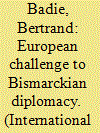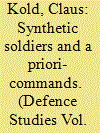| Srl | Item |
| 1 |
ID:
158490


|
|
|
|
|
| Summary/Abstract |
This article reintroduces a long-forgotten argument into the debate about social justice: Durkheim's argument from “organic solidarity,” as presented in The Division of Labor in Society. “Organic solidarity” is solidarity based on differentiation. According to Durkheim, it grows out of the division of labor, but only if the latter happens “spontaneously.” Social inequality creates obstacles to such spontaneity because it distorts prices, such that they are perceived as unjust, and it undermines equality of opportunity. Hence, Durkheim's argument connects commutative justice and distributive justice. The article argues that Durkheim's argument is plausible, interesting, and relevant for today. After presenting the argument, discussing its structure and methodology, and evaluating its plausibility by drawing on related contemporary debates, it focuses on the problem of the perception of social justice and the possibility of ideological distortions. It concludes by sketching the research program that follows from Durkheim's argument.
|
|
|
|
|
|
|
|
|
|
|
|
|
|
|
|
| 2 |
ID:
089810


|
|
|
|
|
| Publication |
2009.
|
| Summary/Abstract |
The Middle East crisis is strongly challenging the principles of classical diplomacy, which this paper has identified as a 'Bismarckian diplomacy'. The Palestinian, Iraqi and Afghan conflicts are bearing upon international relations, in a way that highlights the inefficiencies of a diplomatic orientation centred on power and military force. These transformations shed lights on the roots of Bismarckian diplomacy and its main components; they make clear its Weberian affinities and the controversial distinction between a Weberian approach to International Relations and its 'Durkheimian challenge'. This paper will delineate the main features of this new 'Durkheimian diplomacy', its social orientation, and the emphasis it confers on the social dimension of conflicts in the Middle East.
|
|
|
|
|
|
|
|
|
|
|
|
|
|
|
|
| 3 |
ID:
119772


|
|
|
|
|
| Publication |
2013.
|
| Summary/Abstract |
This article outlines two positions in the ongoing discussion in the sociology of the military regarding the horizontal cohesion of battle groups, the vertical esprit de corps and the influence of both on task efficiency. The two concepts are reached through two different ways of observation - an empiricist field study approach and a rationalist survey approach. Field study data generated through direct observations whereas survey data is generated through indirect observation in which general concepts are used. Central is that the use of different methods, also generate different kinds of data. Such a difference is not merely of theoretical interest but also of vital importance to both the political decision process and the military leadership and management process as they rely on correct intelligence before, during and after operations. This article outlines the discussion between the two positions and then goes on to present an attempt to resolve the discussion between the rationalis and the empiricist position in the sociology of the military by using the theories of Agnes Heller. The central concept to theoretically and practically connect a rationalist and an empirist position is the concept of a vivid present - in this context used as a military vivid present.Its heuristic value is demonstrated through two cases from a field study of Danish KFOR (Kosovo Force).
|
|
|
|
|
|
|
|
|
|
|
|
|
|
|
|